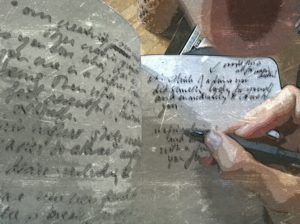 How to Write a Book? Seems like a straightforward, here-are-the-steps, kind of thing.
How to Write a Book? Seems like a straightforward, here-are-the-steps, kind of thing.
It’s not. In my experience, writing a book is a somewhat alchemical process. You take the stuff of heaven and earth and all that lies between and weave it into form. Quite literally, you take thoughts and turn them into a thing, a physical object, a book.
And this process can be scary, overwhelming, confusing or frustrating at times.
When you feel those kinds of feelings, know that you are in a state of resistance. You want to write but you don’t want to write. There’s a war going on inside you.
Winning the War on Writers Block
If you ever feel stuck, struggle with finding your flow, or feel pressure to write without feeling the passion, then you have experienced this internal state of strife.
 There’s an expression, “Peace is just a breath away.” In this case, the words, the flow, the passion are a metaphoric breath away.
There’s an expression, “Peace is just a breath away.” In this case, the words, the flow, the passion are a metaphoric breath away.
I was reminded about this in a consultation with a woman in my Bring Your Book to Life Program today. She struggled with her book. Once or twice as we spoke I heard the passion she felt for the project. I sensed this passion just below the surface. It was clearly there. But she didn’t notice it. All she felt was wrong, blocked, frustrated, mad at herself.
Meet Your Creative Muse
So, we did my favorite exercise. You may have heard me speak about it before. I call it “Meet Your Muse.” I guided her to connect with her inner muse, her creative source and had her ask her muse about how to reconnect and write.
She hadn’t been making the time, so I wanted to start there. I usually insist that writers schedule the time in their calendars in order to make it happen. Her muse would have none of that. “No scheduling.”
And yet, the muse told her, “Set aside time and focus on the book.”
Right Brain / Left Brain
It took me a minute to let that sink in. What’s the difference between scheduling and setting aside time? And then I got it. I realized her muse made a distinction between the left brain dictatorial “scheduling” and the more right brain, gentle, “set aside time.”
That made real sense to me. When we resist something and feel pressured–and pressured was one of the first words she used when our call began–then forcing ourselves to do something will often just create more resistance. She didn’t need more of an inner dictatorship, she needed to enter that sacred, beautiful internal space from which words could find their flow.
Next, her muse told her,
[bctt tweet=”Instead of pushing your book away, sit down and think about it. Give it attention.”]
Think about what you want to talk about.
I sensed that her muse wanted her to just be with the book. I suggested she could even imagine that as she drove her car, her book was placed in the passenger seat next to her. She didn’t have to do anything about it–just be in its presence. My sense was that she needs to draw the book near to her, to be gentle in this process of connecting with her book, getting to know it.
Romancing Your Book
Imagine your book as a potential romantic partner. Flirt with it. Ask it questions. Let it tell you about itself. Get to know it. Don’t just ask it to perform for you, to produce. Engage it. Dance with it. Lie on the grass next to it looking up at the clouds.
 This idea of setting aside time felt better, so we dealt with her second challenge, after making the time. This writer, an academic, had trouble just writing without editing. Instead, she worried over each word, striving for perfection. And every statement needed to be backed up by research.
This idea of setting aside time felt better, so we dealt with her second challenge, after making the time. This writer, an academic, had trouble just writing without editing. Instead, she worried over each word, striving for perfection. And every statement needed to be backed up by research.
Now, you may also have an experience of trying to write from that directive place of “It has to be perfect.” It’s a surefire way to prevent flow!
While I had told everyone in class to try as much as they could to leave holes for research with a note to come back later and fill it in, she couldn’t do that. So, chapters were agonizingly slow and painful. Slow is okay. Pain, I like to figure out how to abate.
Breaking Down Your Inner Parts
I asked her to imagine a few different parts of her: The Muse, The Perfectionist, The Academic/Researcher. And I asked her to thank those aspects of herself when they arose. “Say thank you and let the Perfectionist know that you’ll need her later. Now isn’t the time but she’s going to be very important in the editing process.” The same for the Academic/Researcher. Most research could be left for the end when the writer would very much need that important skill and aspect of herself when the time came.
She agreed to give it a try.
 One More Challenge
One More Challenge
Still, something didn’t quite feel right. “I’m afraid it will take over my life once I get into the writing.”
I asked her to imagine the part of her that worried about this in one chair and her muse in another chair. The dialogue went something like this:
Author: “I’m afraid it will take over my life once I get into the writing.”
Muse: “Nonsense, it’s something you want to do.”
Author: “But I have other commitments, too.”
Muse: “Actually, your book is not a commitment. It’s a joy to be writing it.”
She told me that felt good, but there was still something her muse wanted her to know:
Muse: “You have to write a literary review.”
Author: “Yes. I just have to write that and I will.”
Now, she felt a sense of harmony.
Connect with Your Passion and Joy
My last bit of advice was to help connect her with the passion and joy she had for her subject, something she had not been feeling when she sat down to write. I share that advice with you.
Do something beforehand that puts you in a receptive space—walking, deep breathing, listening to music, flipping through photography books with images related to your subject—whatever works for you. You can experiment with different activities. Then write.
And that is how to write a book: by not thinking of it as a chore, but receiving it as a gift, a joyful privilege, by engaging with it, getting to know it. Be with your book and it will come.


